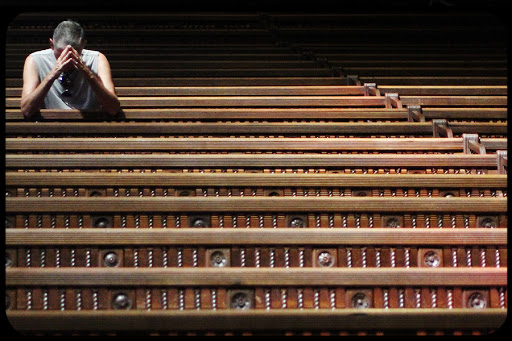Dear Fr. Mike,
Your first step is the one in front of you. I know that sounds like I’m out of the TV show Kung Fu, young grasshopper, but it is true. We all find ourselves at different starting points. That means that our first step is going to be our own; it is going to be very personal and unique to ourselves.
And yet, there are some general guidelines that might apply to your case. A potential first might be your image of God. I cannot stress how important this is to get right. Not only because God deserves to be known as He has revealed Himself, but also because this will shape every subsequent step. If we are under the impression that God needs to be bribed into loving us, or manipulated into helping us, or placated when His “fragile ego” is bruised, then that will shape our prayer. This is the false image of the gods presented in the Greek and Roman myths: the gods were fickle, they couldn’t be trusted, their “love” was arbitrary. It is represented quite well in the movie The Clash of the Titans. In it, the main message is “The gods need us. We grow more powerful the less we pay attention to them.”
The Christian counterpoint to this could be expressed in the Catechism’s teaching that, “Whether we realize it or not, prayer is the encounter of God’s thirst with ours. God thirsts that we may thirst for Him” (CCC 2560). God’s “thirst” for us is not arbitrary or needy. In His perfect self-sufficiency, God has made the irrevocable decision to choose us. This decision (this love) is constant, true, and free.
A second help step might be God’s image of us. Ask the question, “What does God think of me?” If we think that we are merely an annoyance to God, this will shape our prayer (it may even cause us to avoid prayer entirely!). God’s image of you: you are completely unique in all of creation, you are precious to God, you are worth loving. That last piece is critical. I will talk with many people who wrestle with this wound. They do not believe that they are worth loving…especially in their weakness and sin. This wound is in desperate need of healing and this lie is in desperate need of being exorcized.
With these two thoughts in mind, there is a need to take the following step: in spite of the fact that God is infinitely patient with us and has irrevocably chosen us, it is our task to remove any known obstacles between us and God. Here are three possible obstacles: pride, unforgiveness, and distraction.
To root out pride, we must become humble. This doesn’t mean thinking, “I’m so small, so bad, so inconsequential." It simply means telling the truth. And the first truth is that there is a God and you are not Him. It means acknowledging that there is Someone infinitely “bigger” and infinitely better than you. And that this Someone believes that you are worth loving. Humility always tells the whole truth; the happy truths and the hard truths. To know if you are humble, ask yourself, “Am I open to being taught, or do I resent instruction and correction?” The refusal to forgive hardens our hearts to God, to others, and even makes it difficult to know ourselves. If I am aware that I hold bitterness in my heart, I need to make some effort to express that I am choosing to forgive. This can be extremely difficult (and will most likely have to be repeated many times in some cases!). Remember, forgiveness is not excusing someone’s actions, and it is not ignoring real pain. It is the choice to “will the good of the other." While our emotions can still be inflamed, our decision to pray for someone’s eternal soul (we could say “praying for their conversion…praying that God’s will is done in their life”) not only fulfills our Lord’s command, but frees us.
Distractions can be anything that diverts our attention from what or who should have our attention at a given moment. Sometimes we utilize diversions for entertainment and stress relief; that’s great. If recreation is what we should be doing, then games or entertainment aren’t the wrong thing…they’re the right thing. But if I invite distractions in so that I don’t have to think about the present, then I am most likely keeping God out of the moment and out of my life. This step is nothing more than the “living deliberately” of which Thoreau wrote. Keep in mind that these are just some very simple beginning steps. None of them can be taken without grace; that is, without the help of God. But remember, God wants to help you take each of these steps. And He is infinitely patient with us while we are learning to walk. Next, we will look at what the next step might be.
Father Mike Schmitz is the chaplain for Newman Catholic Campus Ministries at the University of Minnesota Duluth. He also serves as the Director of the Office of Youth Ministry for the Diocese of Duluth. This column is a feature of bulldogcatholic.org and is published here with permission. You can submit questions to Fr. Mike at askfrmike@aleteia.org. You can also listen to Fr. Mike’s homilies here and at iTunes .

